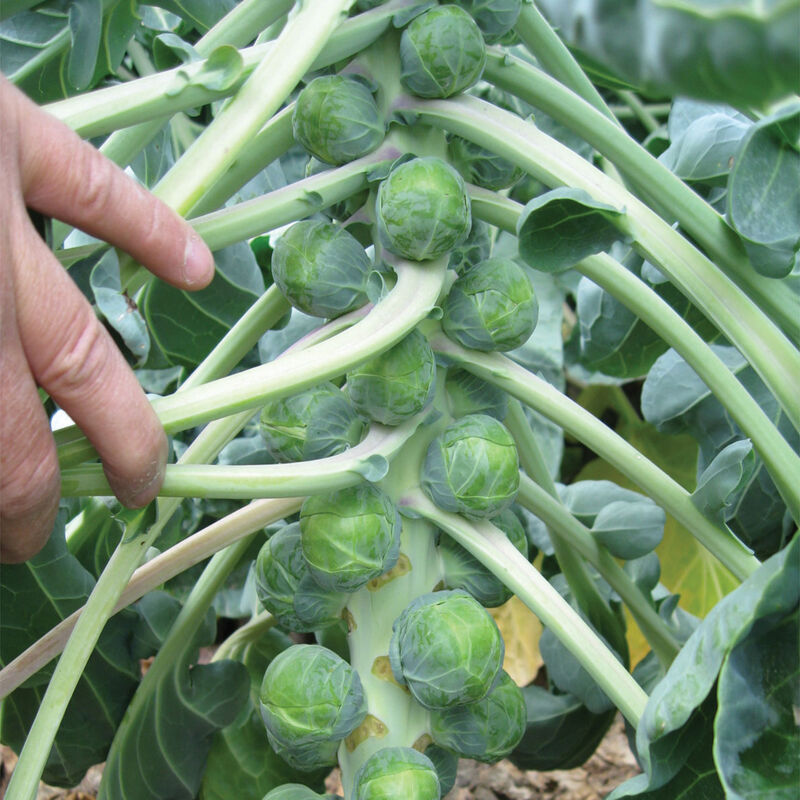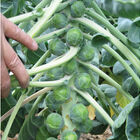Divino (F1) Brussels Sprout Seed
Product ID:4566.114566
Divino (F1) Brussels Sprout Seed
Product ID:4566.114566
Tall stalks resist lodging.
Firm, uniform, and attractive sprouts hold well on the stalk for whole-stalk harvest. Medium-size sprouts. For late-season harvest.Specs:
- This product does not ship to the following countries: United Arab Emirates, Austria, Australia, Barbados, Belgium, Bulgaria, Bermuda, Bahamas, Switzerland, Cyprus, Czech Republic, Germany, Denmark, Estonia, Spain, Finland, France, United Kingdom, Greece, Hong Kong, Croatia, Hungary, Ireland, Iceland, Italy, Japan, Republic of Korea, Kuwait, Cayman Islands, Lithuania, Luxembourg, Latvia, Malta, Netherlands, Norway, New Zealand, Oman, Poland, Portugal, Qatar, Romania, Saudi Arabia, Sweden, Singapore, Slovenia, Slovakia, San Marino, Thailand, Trinidad and Tobago, Taiwan, Ukraine.
CULTURE:
Brussels sprouts prefer an irrigated, fertile soil with a pH above 6.0.DAYS TO MATURITY:
From date of transplanting. Add about 20 days if direct seeding.TRANSPLANTING:
In May, sow 2–3 seeds per cell in 72-cell plug flats or 3–4 seeds per inch in 20-row flats ¼" deep. Seedlings should be ready to transplant in 4–6 weeks. Space 18–24" between plants, in rows 30–36" apart. To maintain steady growth, the crop should be well-fertilized and irrigated in dry weather.DIRECT SEEDING:
About 4 months before expected fall frost, sow 3 seeds every 18", ¼–½" deep, in rows 30–36" apart; thin to 1 plant per spot.INSECT PESTS:
Repel flea beetles and root maggots on young seedlings by covering with floating row covers from day of planting. Treat flea beetles with pyrethrin or azadirachtin if heavy pressure is observed. For cabbage worms and loopers, use Bacillus thuringiensis (Bt.). Cutworm prevention: Cultivate soil 2–4 weeks before planting to work in cover crops and destroy weeds.DISEASE:
Adhere strictly to a preventive program including: (1) long crop rotations with non-brassica crops, (2) clean starting mixes and outdoor seedbeds, and (3) strict sanitation practices. Johnny's Selected Seeds only sells seed lots of Brussels sprouts that have tested negative for black rot (Xanthomonas campestris pv. campestris) and black leg (Phoma lingam).NOTE:
A disease-free test result means that in the sample tested, the pathogen targeted was not found. It does not guarantee a seed lot to be disease-free. However, no method of seed treatment can positively insure freedom from disease. We are glad to help with specific questions.WHOLE-STALK HARVESTING, MARKETING, AND TOPPING:
For a once-over harvest (uniform maturity of most sprouts on the plant) and whole-stalk marketing, the plants should be topped by pinching out the growing point (rosette of several small leaves at the top of the plant) when the lower sprouts are ½–¾" in diameter. A full stalk of uniform-size sprouts will develop in about 4 weeks.HARVEST:
Pick after frost and until the end of December in most areas, and through the winter where cold is not severe. Sprouts should be firm and well-formed. Break off the leaf below the sprout and snap off the sprout. The upper sprouts will continue to form and enlarge as the lower ones are harvested.STORAGE:
Before ground freezes, pull plants out by the roots and place in a humid cooler at 32°F (0°C) or cold cellar for 4–6 weeks.TRANSPLANTS (AVG.):
800 plants/1,000 seeds.SEEDS/LB.: See individual varieties.
PACKET:
100 seeds, sows 33'.Johnny's is committed to your success, every step of the way.
We want you, our customer, to be 100% satisfied with all of our seeds, tools, and supplies.
If anything you purchase from us proves unsatisfactory, we will either replace the item or refund the purchase price.




